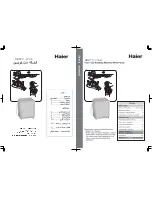
Wool
These fabrics are labelled either machine wash
or hand wash. The Wool/hand wash programme
is at least as gentle as washing by hand.
Wool is especially sensitive to processes such as
washing.
If you do not wish to spin dry, you can squeeze
out the water using terry towels. In this case select
No spin.
To find out how to choose this setting, see the
"Washing" chapter. However, most garments can
withstand a short spin. Choose a short spin by
selecting a spin speed of 800 rpm or less.
Rayon fibres and synthetic fibres
Materials made of rayon fibres, such as viscose,
and some synthetic fibres are very delicate and
require much space so as not to crease. Only half
fill the drum when washing and choose a spin
speed of 800 rpm or lower.
NOTE!
Viscose and acetates are fragile when wet.
Reducing allergic reactions
The washing machine has a Super Rinse option.
Use this for people with sensitive skin, such as
those with allergies and small children.
Save time and energy
Use the Everyday wash programme to save time
and energy. This programme has a shorter main
wash than Standard cotton, but is often sufficient
for lightly soiled washing.
High water level
If you want more water for the main wash and
rinses, you can use the High water level option.
High water level is used automatically in the
Wool/Hand programme.
Economy and efficiency
You can save a lot of energy by not using higher
temperature programs than necessary.
• Select Quick if you just need to freshen up
shirts or exercise clothes, for example. This
will save both water and energy.
• If you select a fast spin speed, this reduces
energy consumption when drying in a tumble
dryer or drying cabinet.
• Always wash with a full load when using the
Heavy, Everyday wash and Standard cotton
programmes.
• Avoid pre-washing. Modern machines and
detergents clean effectively without
pre-washing. Pre-washing is only necessary
for heavily soiled washing.
Detergents
Eco-labelled detergents are less harmful to the
environment.
Detergent overdosing does not give better
washing results; it merely causes a greater impact
on the environment.
Try to use less detergent, and increase only if you
are not satisfied with the results.
Dyeing fabrics
If you want to dye fabrics in the machine, select
the Everyday wash programme with the Super
Rinse option. Select temperature according to the
dye manufacturer’s recommendations.
Choose a low spin speed if the fabric to be dyed
is a blended material such as
polyester/cotton.
NOTE!
Add the dye directly to the washing drum – not
to the detergent compartment. After dyeing, you
should run the machine empty using the same
program. Use the normal amount of detergent.
9
Advice and tips before washing










































